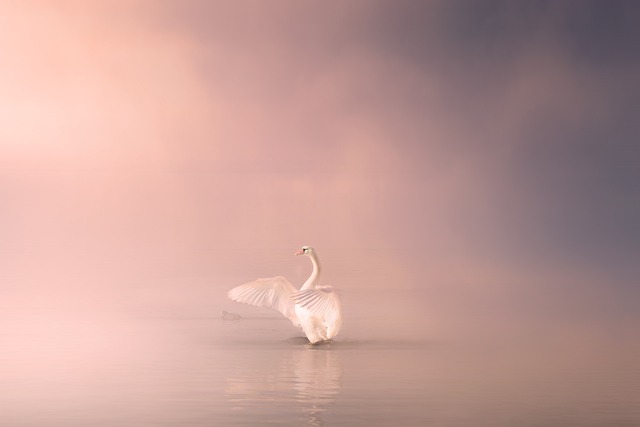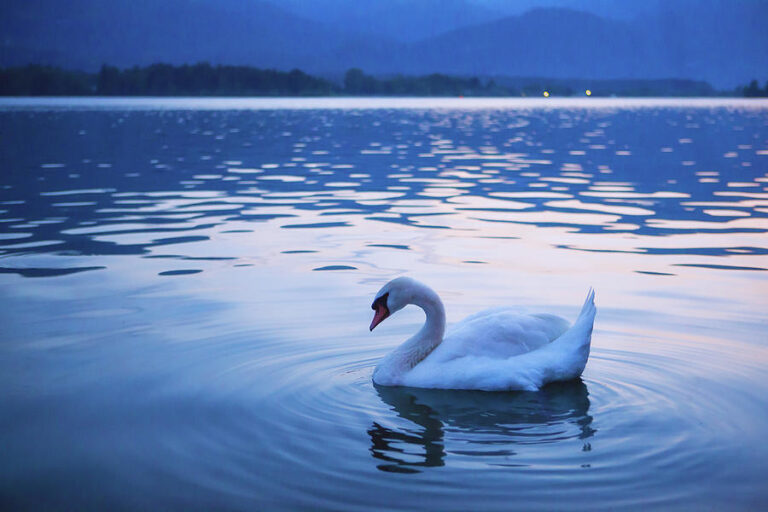Many swans, especially juveniles, prefer to be alone for some time before mating.
Another answer to that is, swan pairs are less likely to stay together than their more successful counterparts if they are poor at reproducing.
Even couples with a history of successful breeding have a chance of drifting apart. About 3% of swan couples experience this, but the rate is much greater than 9% for swans whose reproductive efforts were unsuccessful.
Why would a swan be alone- 12 Reasons

Swans are known for their strong pair ties during mating season, often reflected in their depiction as emblems of elegance and fidelity in literature and mythology. Sometimes, these stunning animals are alone, separated from their flocks, or unattached. Here’s why-
- Death
Swans go through grief if one of their partners has just died. While you may observe a few mourning swans in a group, you’ll usually find them nesting alone.
- A temporary Separation
Swans are monogamous. If you see one alone, its partner might hide in the bushes or under the leaves. Swans like to be near their partners, but it does not always mean they stick together constantly.
- It’s Not Mating Season
While a married pair of swans will spend most of their time together, it is common to see solitary swans outside the mating season.
Swans usually reproduce in the spring. Therefore, swans that have found their soulmate will continue courting until then. If they haven’t yet, it’s not uncommon to see them out and about on their own.
- Divorce
Some swan couples end up “divorcing,” despite the swans’ innate preference for monogamy. This is due to the pair’s inability to mate or one member has decided to seek another swan.
- Seasonal Migration
Swans adapt their travel routes according to the seasons as a migratory species. During their annual migration, swans cover great distances to look for new homes and food.
As a result of their migration, certain animals may find themselves temporarily separated from their normal flocks or partners.
- Pair Bonds
Swans have elaborate wooing displays and build strong pair connections throughout the mating season. But not all swans are that lucky during this time.
Due to circumstances like age, health, and competition from other swans, some people may choose to remain single.
- Illness or Injury
Swans, like any other animal, can get hurt or sick. The sickness requires them to isolate themselves for protection, or so they can heal. Sick or injured swans often wander out by themselves to recover.
- Age
Swans typically find their life partner before age two, so it seems sense that younger swans wouldn’t have coupled up quite yet.
Before they are mature enough to court, they still have a long way to go. They will pair off and start constructing a communal nesting area when right.
- Territory and Competition
Because of their territorial nature, some swans may live alone rather than risk fighting with others over territory or resources. Due to territorial disputes between pairs, some swans may be forced to live in solitude.
- Immature Swans
The inability to create pair bonds at a young age might leave immature or young swans on their own. Young swans tend to remain with their parents for a while after birth.
- Habitat Availability
Swans are quite versatile and can make do in many different kinds of water. Swans are typically seen in pairs. However, this isn’t always the case because of the wide variety of locations they may call home.
- Life Stage and Molting
During their annual molting process, swans lose and re-grow their flying feathers. Because they can’t fly at this period, they may try to find a place to flee away from other swans and other predators.
Do swans mate for life
Yes, many species of swans are monogamous, meaning they stay with the same partner for the rest of their lives. When a swan finds a mate, it tends to stick with them for life, at least through the breeding season.
Swans perform extensive courting rituals to form and maintain stable pair bonds. These performances may include coordinated swimming, reciprocal preening, and vocalizations.
After establishing a partnership, both parents contribute to the care of their eggs and subsequent young, called cygnets.
Most swan species are monogamous, but there are always outliers. Some swans will find a new partner if their current one dies, while others may go through the breeding season without mating.
Divorce and extramarital affairs are typical occurrences. It has been shown that Australian black swans have a higher rate of adultery than other swan species. One of every seven eggs a male black swan incubates is from a different female.
Although swans are known for being monogamous, the extent to which this holds varies between species and groups. Separation or “divorce” can occur even within monogamous couples when one partner cheats, or the other partner leaves for another reason.
Overall, the swan’s monogamous behavior throughout the breeding season exemplifies its high level of social and emotional intelligence and adds to the solid foundation of the family unit.
FAQs
Why are 3 swans together?
While foraging for food, swans often form social groups. This is especially relevant for young swans, who must locate a partner and have evolved a complex wooing ritual.
Can swans live without a mate?
Many swans spend their whole lives with the same spouse. However, if one dies, the surviving swan may go on to find another mate rather than stay a bachelor for the remainder of its days.
What happens if a swan loses its mate?
Swans are monogamous, and the ties they create with their partners can last for decades or even a lifetime. Because of the legends surrounding their devotion to one another, a pair of swans floating together, necks intertwined to form a heart, is almost universally recognized as a sign of romantic love.
How long do swans normally live?
Swans in the wild have an average lifespan of 9–12 years. However, there are several reports of swans lasting far into their twenties and thirties. Various cygnets (young swans) don’t make it through the first three months of life is because of the various dangers they confront.
Why do swans gather in groups?
In the field, they frequently congregate in clusters. It’s common for one or two swans to locate a prime feeding and watering place, and once the rest of the flock catches wind, they’ll head in the same direction. There’s strength in numbers, as many creatures have learned.
What happens if a swan loses its mate?
If one partner dies, the other will grieve just like people do and then decide whether to remain in the same location alone, go to a different body of water in search of a new partner, or return to a flock.
Final Verdict
Despite the swan’s reputation for being a gregarious bird that sticks close to its partner, several factors might lead to the bird being alone. There are several reasons Why would a swan be alone, including seasonal migration and personal circumstances.
Knowing these things can help us develop a deeper respect for the lives of these beautiful animals and serve as a reminder of the significance of protecting their natural environments. As watchers, we must remember that they, too, may want quiet time alone to flourish.

